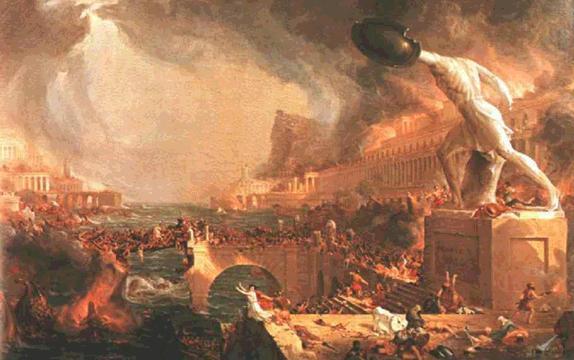Augustine paints a picture of ancient Rome for us modern folk.
Chapter 20
The worshipers and devotees of those gods of yours, the men who gaily ape their vices and depravities, are not in the least disturbed to see their country wallow in a dismal swamp of immorality. ‘As long as it endures,’ they say, ‘as long as it prospers amid plenty and can boast of victories and enjoy the security of peace, what do morals matter to us? What concerns us more is that everyone should become richer and richer, so as to be able to bear the costs of his daily excesses, and to lord it over his economically weaker fellows. Let the poor toady to the rich in order to fill their stomachs and enjoy indolent ease under their patronage. Let the rich use the poor to surround themselves with a crowd of satellites and to enhance their prestige. Let the mob applaud, not those who think of what is good for them, but those who minister to their pleasures. Let no one impose toil and trouble, or prohibit impure pleasures. Rulers must not bother whether their people are virtuous, if only they can keep them subject. The people of the provinces must not obey the governors as guardians of their morals, but as managers of their affairs and purveyors of their pleasures. They are not to show them sincere respect, but cower before them in base servility. As for the laws, let them look to wrongs against property without bothering about moral propriety.
No one should be brought to court, except one who has done harm or nuisance to another’s property, home, or limb, or to an unwilling party. As for the rest, each man can do his own sweet will with his goods, with his subjects, or with the goods or subjects of any others who consent. Let there be public harlots in abundance for all who would indulge their lust, and, above all, for those who have no mistresses of their own.
Let houses be built, spacious and exquisitely furnished, and let people come to sumptuous banquets where each one can gamble and drink and vomit and carouse day or night, as much as he pleases or is able. Let the noise of dancing be everywhere. Let the theatres resound with lewd merriment and with every kind of cruel and vicious pleasure. Let the man who dislikes these pleasures be branded as a public enemy, and, should he attempt to interfere with them, let the mob be free to hound him to death. Let those rulers be regarded as true gods who devote themselves to giving the people a good time, and guarantee them its continuance. Let them be worshiped in the manner they desire, and demand the plays they please, in the company, or at the expense, of their devotees. Only let them take care that no foe, no plague, no calamity interfere with this reign of prosperity.
What man in his right senses would place this kind of commonwealth on the same level with, I do not say the Roman Empire, but with the house of Sardanapalus. This king abandoned himself so completely to dissipation that on his tomb he had inscribed that in death he possessed only what in life his lust had enjoyed. If those pleasureseekers had a king of that sort, who indulged them in such things and placed not the slightest restraint on anyone’s whim, they would dedicate to him a temple and a high-priest more readily than did the ancient Romans to Romulus.
Augustine of Hippo, The City of God, Books I–VII, ed. Hermigild Dressler,
Chapter 20
The worshipers and devotees of those gods of yours, the men who gaily ape their vices and depravities, are not in the least disturbed to see their country wallow in a dismal swamp of immorality. ‘As long as it endures,’ they say, ‘as long as it prospers amid plenty and can boast of victories and enjoy the security of peace, what do morals matter to us? What concerns us more is that everyone should become richer and richer, so as to be able to bear the costs of his daily excesses, and to lord it over his economically weaker fellows. Let the poor toady to the rich in order to fill their stomachs and enjoy indolent ease under their patronage. Let the rich use the poor to surround themselves with a crowd of satellites and to enhance their prestige. Let the mob applaud, not those who think of what is good for them, but those who minister to their pleasures. Let no one impose toil and trouble, or prohibit impure pleasures. Rulers must not bother whether their people are virtuous, if only they can keep them subject. The people of the provinces must not obey the governors as guardians of their morals, but as managers of their affairs and purveyors of their pleasures. They are not to show them sincere respect, but cower before them in base servility. As for the laws, let them look to wrongs against property without bothering about moral propriety.
No one should be brought to court, except one who has done harm or nuisance to another’s property, home, or limb, or to an unwilling party. As for the rest, each man can do his own sweet will with his goods, with his subjects, or with the goods or subjects of any others who consent. Let there be public harlots in abundance for all who would indulge their lust, and, above all, for those who have no mistresses of their own.
Let houses be built, spacious and exquisitely furnished, and let people come to sumptuous banquets where each one can gamble and drink and vomit and carouse day or night, as much as he pleases or is able. Let the noise of dancing be everywhere. Let the theatres resound with lewd merriment and with every kind of cruel and vicious pleasure. Let the man who dislikes these pleasures be branded as a public enemy, and, should he attempt to interfere with them, let the mob be free to hound him to death. Let those rulers be regarded as true gods who devote themselves to giving the people a good time, and guarantee them its continuance. Let them be worshiped in the manner they desire, and demand the plays they please, in the company, or at the expense, of their devotees. Only let them take care that no foe, no plague, no calamity interfere with this reign of prosperity.
What man in his right senses would place this kind of commonwealth on the same level with, I do not say the Roman Empire, but with the house of Sardanapalus. This king abandoned himself so completely to dissipation that on his tomb he had inscribed that in death he possessed only what in life his lust had enjoyed. If those pleasureseekers had a king of that sort, who indulged them in such things and placed not the slightest restraint on anyone’s whim, they would dedicate to him a temple and a high-priest more readily than did the ancient Romans to Romulus.
Augustine of Hippo, The City of God, Books I–VII, ed. Hermigild Dressler,
Augustine paints a picture of ancient Rome for us modern folk.
Chapter 20
The worshipers and devotees of those gods of yours, the men who gaily ape their vices and depravities, are not in the least disturbed to see their country wallow in a dismal swamp of immorality. ‘As long as it endures,’ they say, ‘as long as it prospers amid plenty and can boast of victories and enjoy the security of peace, what do morals matter to us? What concerns us more is that everyone should become richer and richer, so as to be able to bear the costs of his daily excesses, and to lord it over his economically weaker fellows. Let the poor toady to the rich in order to fill their stomachs and enjoy indolent ease under their patronage. Let the rich use the poor to surround themselves with a crowd of satellites and to enhance their prestige. Let the mob applaud, not those who think of what is good for them, but those who minister to their pleasures. Let no one impose toil and trouble, or prohibit impure pleasures. Rulers must not bother whether their people are virtuous, if only they can keep them subject. The people of the provinces must not obey the governors as guardians of their morals, but as managers of their affairs and purveyors of their pleasures. They are not to show them sincere respect, but cower before them in base servility. As for the laws, let them look to wrongs against property without bothering about moral propriety.
No one should be brought to court, except one who has done harm or nuisance to another’s property, home, or limb, or to an unwilling party. As for the rest, each man can do his own sweet will with his goods, with his subjects, or with the goods or subjects of any others who consent. Let there be public harlots in abundance for all who would indulge their lust, and, above all, for those who have no mistresses of their own.
Let houses be built, spacious and exquisitely furnished, and let people come to sumptuous banquets where each one can gamble and drink and vomit and carouse day or night, as much as he pleases or is able. Let the noise of dancing be everywhere. Let the theatres resound with lewd merriment and with every kind of cruel and vicious pleasure. Let the man who dislikes these pleasures be branded as a public enemy, and, should he attempt to interfere with them, let the mob be free to hound him to death. Let those rulers be regarded as true gods who devote themselves to giving the people a good time, and guarantee them its continuance. Let them be worshiped in the manner they desire, and demand the plays they please, in the company, or at the expense, of their devotees. Only let them take care that no foe, no plague, no calamity interfere with this reign of prosperity.
What man in his right senses would place this kind of commonwealth on the same level with, I do not say the Roman Empire, but with the house of Sardanapalus. This king abandoned himself so completely to dissipation that on his tomb he had inscribed that in death he possessed only what in life his lust had enjoyed. If those pleasureseekers had a king of that sort, who indulged them in such things and placed not the slightest restraint on anyone’s whim, they would dedicate to him a temple and a high-priest more readily than did the ancient Romans to Romulus.
Augustine of Hippo, The City of God, Books I–VII, ed. Hermigild Dressler,
0 Comments
0 Shares
236 Views





